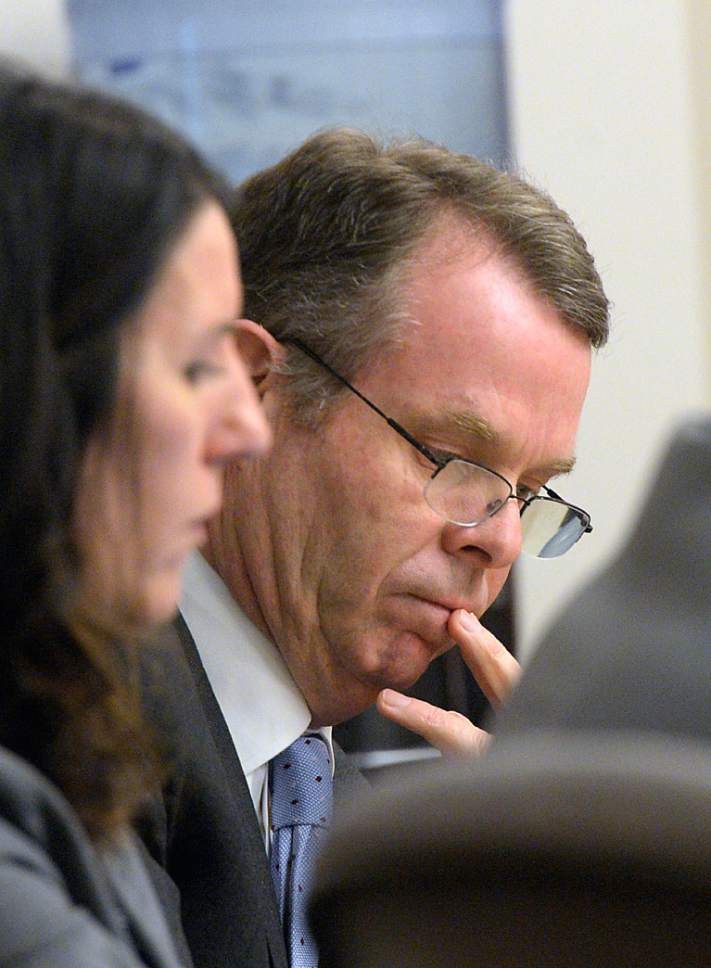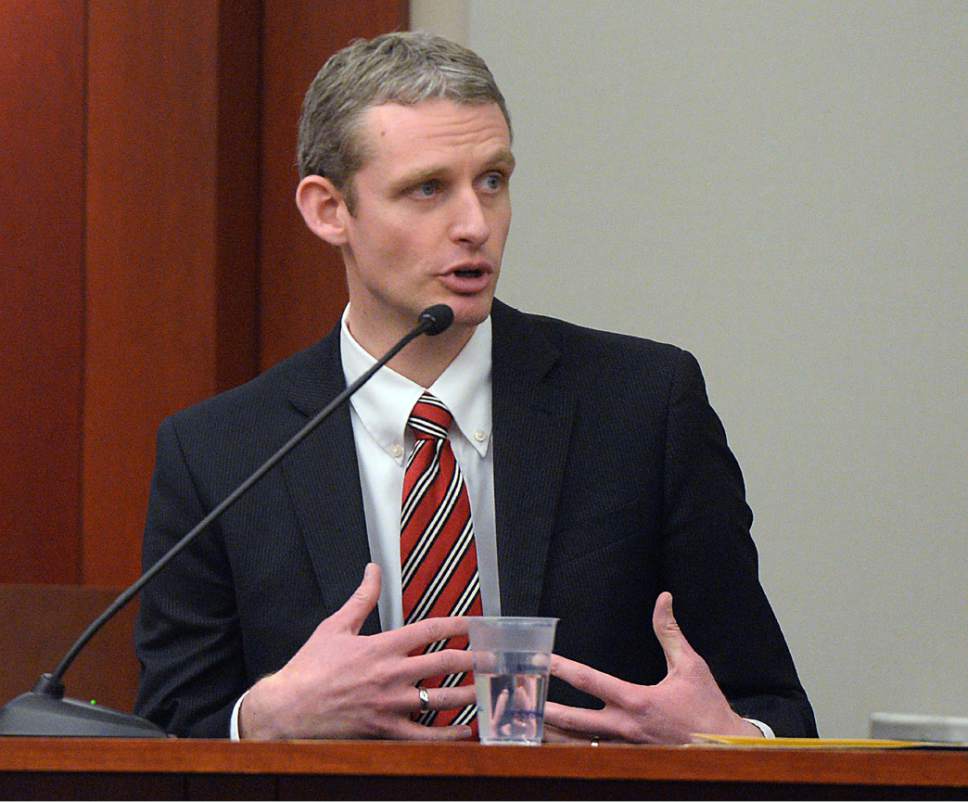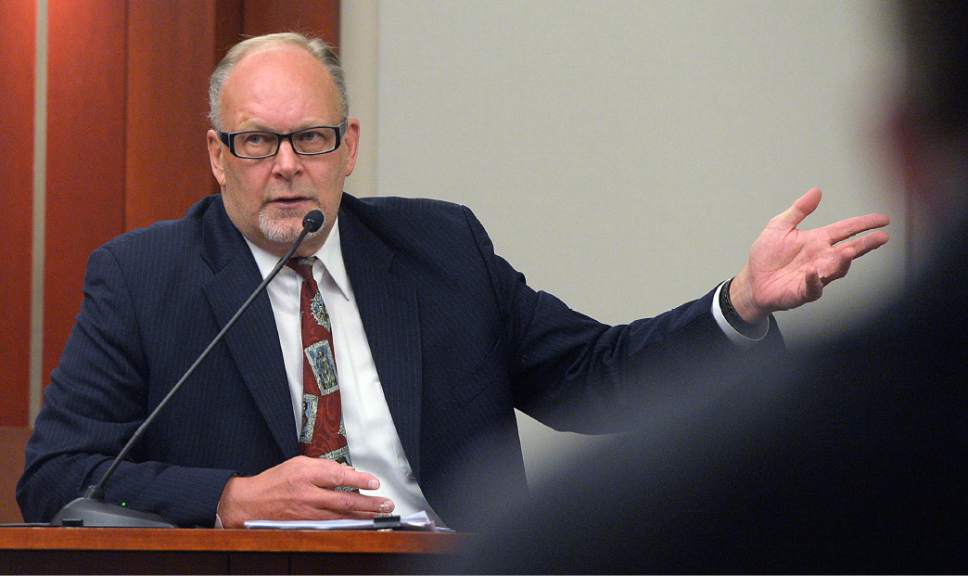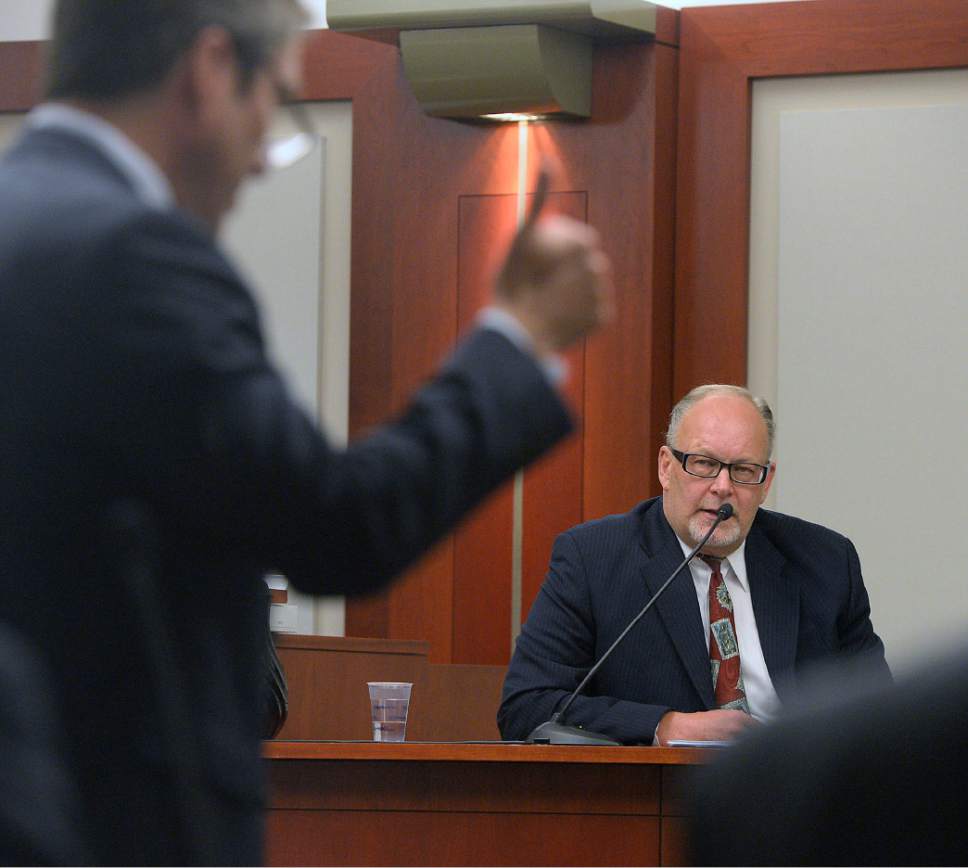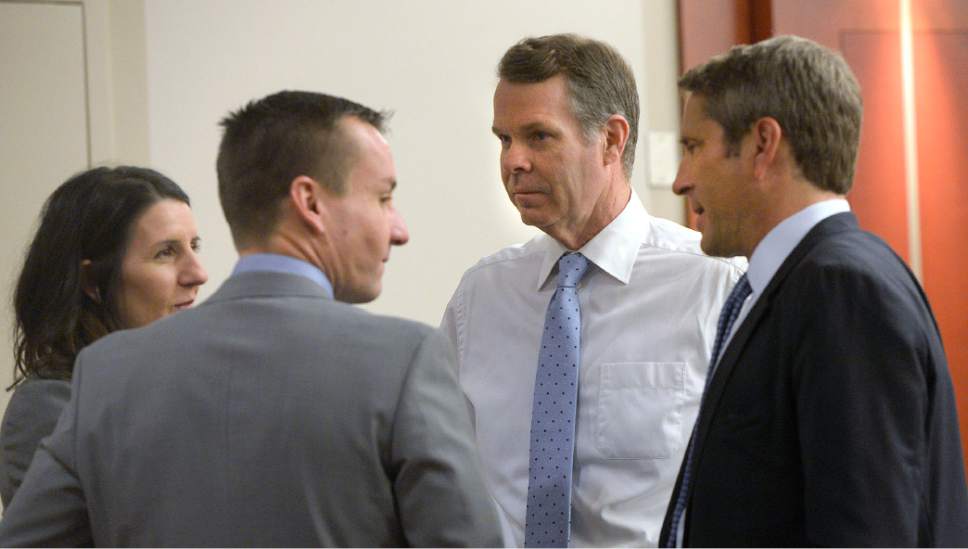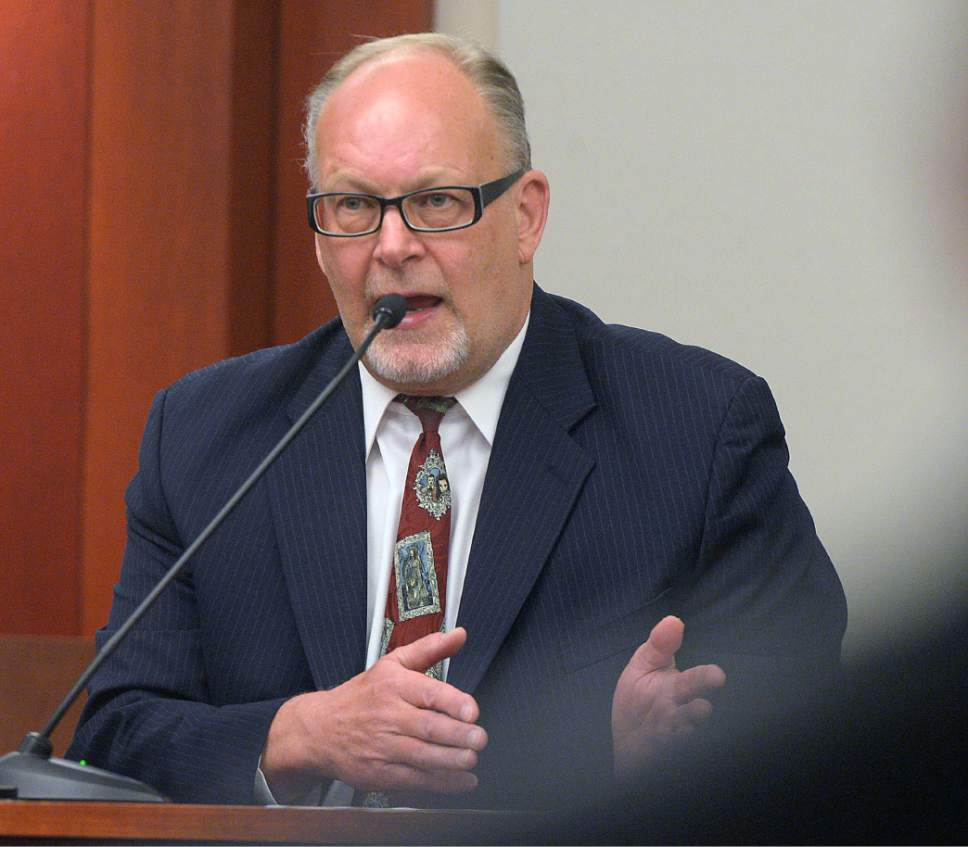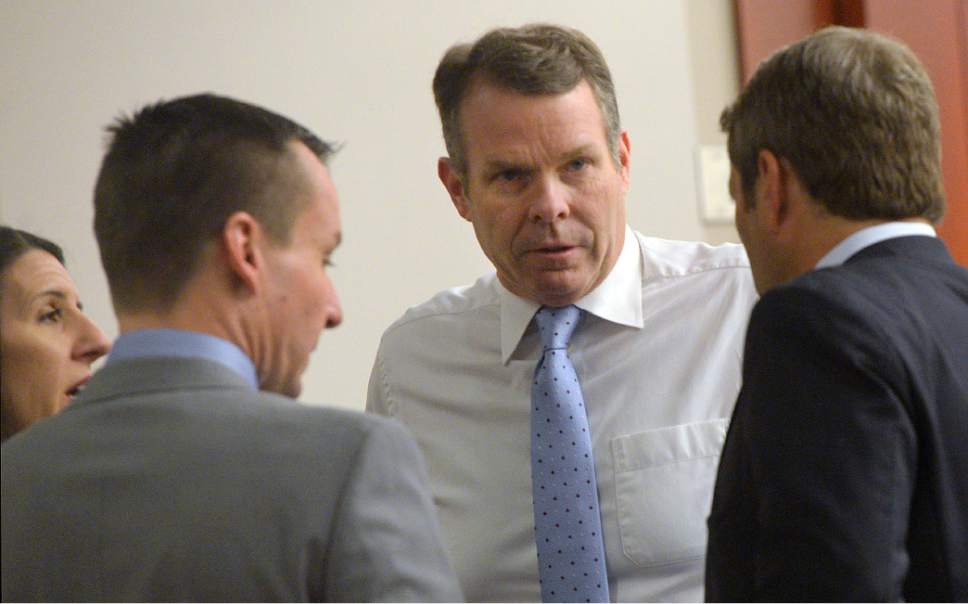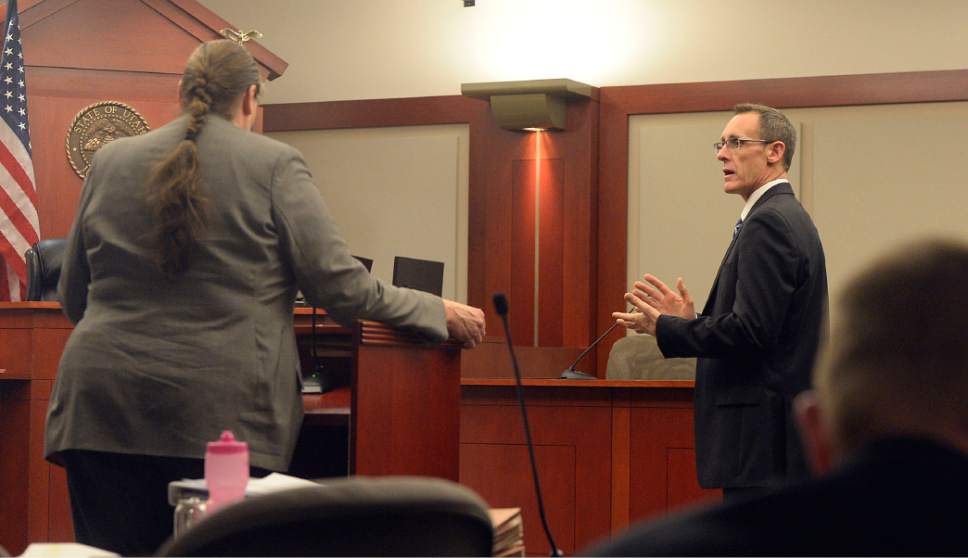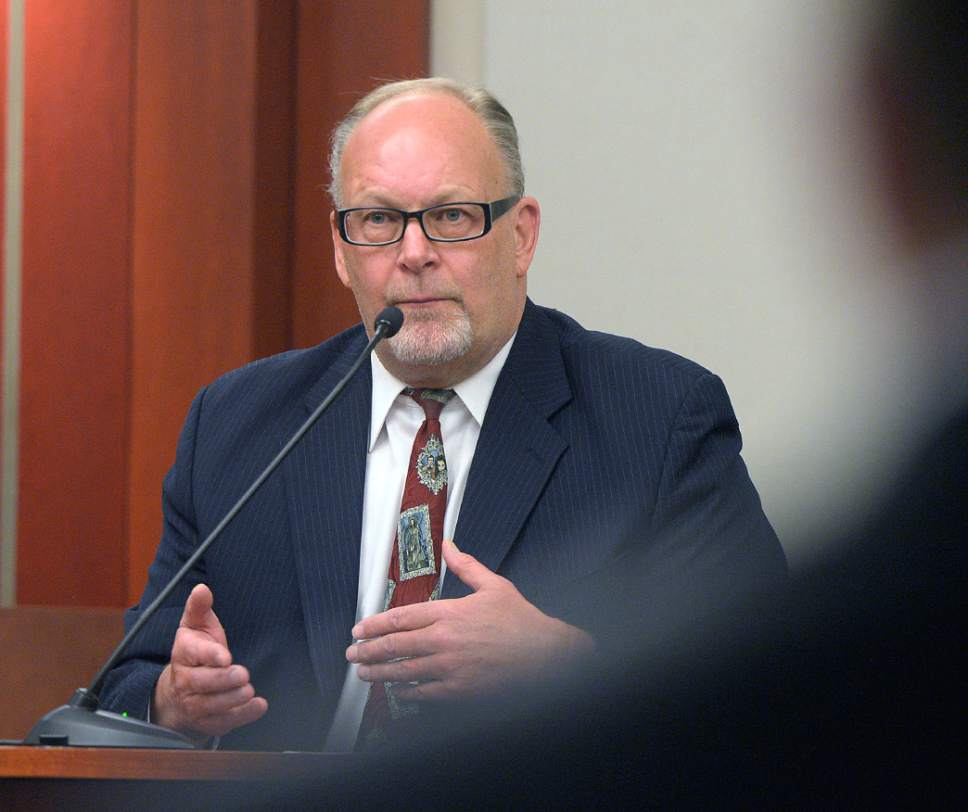This is an archived article that was published on sltrib.com in 2017, and information in the article may be outdated. It is provided only for personal research purposes and may not be reprinted.
For a second day, a major state witness in the public-corruption trial of former Utah Attorney General John Swallow took the stand and again refused to testify, invoking his right against self-incrimination, despite an offer of immunity.
"I believe I'm doing the right thing by exercising my Fifth Amendment right," Jeremy Johnson said Thursday, even though 3rd District Judge Elizabeth Hruby-Mills reminded him she had ordered him to answer questions.
With that, the judge sent Johnson back to the Salt Lake County Jail, where she ordered him Wednesday to serve a 30-day sentence for contempt of court.
Hruby-Mills refused Thursday to vacate her contempt finding, ruling that the agreement offered to Johnson by prosecutors provided him with sufficient state and federal immunity.
Johnson, dressed in red jail duds, was ordered to return to court Friday and be given another chance to reconsider his decision.
It was unclear Thursday how Johnson's silence might impact the case. He is seen as a key witness. After all, four of the 13 felony and misdemeanor counts are tied to Swallow's dealings with Johnson or an intermediary. Salt Lake County prosecutors certainly can point to other evidence, but they could be forced to amend or toss out some charges.
At the least, they may have to find another way to provide the testimony they planned to get from Johnson, who is serving an 11-year federal prison sentence and was brought from California to testify.
"You have to pivot," Salt Lake City attorney David Shapiro said. "Find some other way to get where you want to go. I don't think it's different than other decisions you make during trial, though."
The absence of Johnson's testimony also may offer Swallow's defense team a chance to remind jurors that they were promised critical evidence from Johnson — and then didn't get it.
"It's always a problem when you promise a jury they are going to hear from a witness and then they don't," he said. "Jurors are smart. They are going to wonder about it, and I expect the defense will capitalize on that."
Neither prosecutors nor defense lawyers would comment Thursday on the possible effect of Johnson's actions.
Swallow has pleaded not guilty to all 13 counts. If convicted, he could spend up to 30 years in prison.
Johnson's stance stems from a long-running mistrust of the government, specifically federal investigators and prosecutors.
The government has a history of breaking its promises to Johnson and, as drafted, the immunity letter from Salt Lake County prosecutors offers no ironclad assurance of protection, his lawyer Mary Corporon told the judge.
In fact, Corporon suggested, it might be a trap if Johnson makes a misstep or says anything that could be seen as outside the scope of a prosecutor's question.
"The federal government is hot after prosecuting Jeremy Johnson," Corporon said. "Any perceived discrepancy of any description would be found under that exception."
A letter from the U.S. Justice Department, she noted, also "doesn't say it [Johnson's testimony] won't be used against him in trial and won't be used to investigate charges against him."
Corporon also expressed concern that the immunity deal doesn't appear to offer Johnson safeguards in other jurisdictions. That's based on her conversation with Davis County Attorney Troy Rawlings, who, she said, told her that this immunity offer cannot extend beyond the boundaries of Salt Lake County.
Rawlings was deputized as a special assistant Utah attorney general as part of the investigation that brought the charges against Swallow and his immediate predecessor, former three-term Attorney General Mark Shurtleff.
Rawlings earlier had offered Johnson immunity in the Shurtleff case — which was dismissed last year — and as part of wider corruption investigation the prosecutor has pursued. But Washington didn't honor that agreement, Corporon said, so Rawlings believes it's now void.
"That is a perfect demonstration of the problem I have as the defense counsel attempting to advise Mr. Johnson what to do," she told the judge.
Deputy Salt Lake County District Attorney Fred Burmester then expressed frustration that Rawlings had been inserted into the case, saying the Davis County attorney was working to undermine the Swallow prosecution.
"I don't know what his motive is," Burmester said. "He's acting like a Tasmanian devil swirling around."
Rawlings, who could be a witness in the Swallow matter, hit back in a statement to reporters hours later, saying he wouldn't shirk what he believed was an ethical duty to Johnson, a "key figure and witness in the larger scope of potential criminality."
Corporon and her co-counsel, Karra Porter, said they had, at the judge's behest, worked with prosecutors Thursday on a new immunity proposal that would satisfy the Justice Department and their client.
Porter wasn't sure that could be achieved but didn't rule out the possibility that Johnson ultimately would testify.
"If there were pink dinosaurs downstairs and all of these dominoes were resolved and we felt 100 percent certain that he was fully protected, he's willing to do his duty as a citizen," Porter said outside the fourth-floor Salt Lake City courtroom.
If Johnson ever takes the stand, prosecutors expect him to testify that Swallow used his $1.5 million Lake Powell houseboat and took flights on the St. George businessman's corporate jet.
He also could shed light on Swallow's involvement in an attempt to stall an investigation into Johnson's online-marketing company and an effort to get the Utah attorney general's office to sign off on the processing of online-poker payments by Johnson and his partners at a now-defunct St. George bank.
Before his return to the Beehive State, Johnson has been under guard in Taft, Calif., at what he calls a "lovely federal prison camp." So will another night in the county lockup change the recalcitrant witness's mind? The parties may find out Friday.


